Saudi Cup: Female jockeys 'most welcome' at new $27m race meeting
- Published
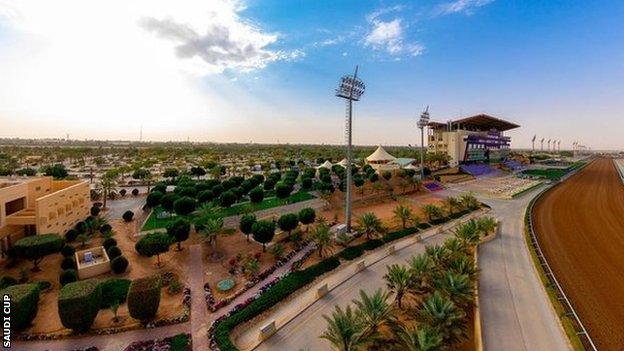
The $20m Saudi Cup will be the feature race at the Riyadh track, with other races worth nearly £7m
Female jockeys will be encouraged to take part in a new $27m horse racing meeting in Saudi Arabia.
The Saudi Cup will be the world's richest race and is scheduled to take place in the nation's capital, Riyadh, on 29 February next year.
Saudi Arabia's Prince Bandar said female jockeys would be "most welcome" - the country has faced criticism over its record on women's rights.
He told BBC Sport the event was part of efforts to "transform" the country.
"Men and women will be treated equally," he said when asked about jockeys.
A promotional event in London was attended by key British racing figures, including jockey Frankie Dettori and top trainers such as Sir Michael Stoute and John Gosden.
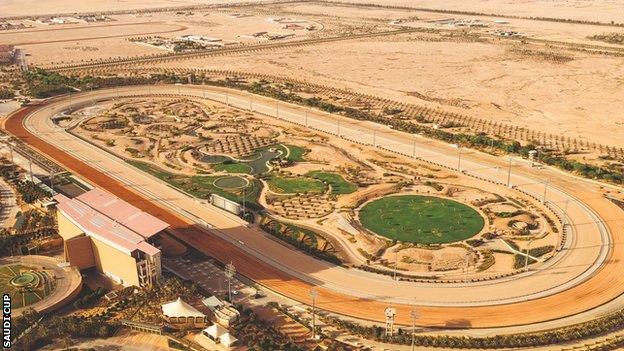
The turf course is being laid over the inner training track at the venue in Riyadh
It is the latest in a series of sporting events set to be held in Saudi Arabia, with boxing's world heavyweight title rematch between Andy Ruiz and Anthony Joshua scheduled to take place in December.
This has led to accusations of "sportswashing" - that the oil-rich nation is using sport to deflect criticism elsewhere.
Amnesty International has highlighted the country's "abysmal" human rights record.
Heavy restrictions on freedom of expression and women's rights have been raised, as has the use of the death penalty for offences not recognised as crimes under international law.
Prince Bandar, whose great uncle Prince Khalid Abdullah has owned leading racehorses such as Frankel and Enable, suggested the country was preparing for a "more open" era.
"We are going through a transformation in the kingdom. We are learning, but we are opening up and there is a political will to go there," he said.
Jamie Osborne, who trains at Lambourn in Berkshire and saddled Toast Of New York to win the UAE Derby five years ago, welcomed the invitation to female jockeys.
"If we have a runner, Nicola [Currie] will ride," he said.
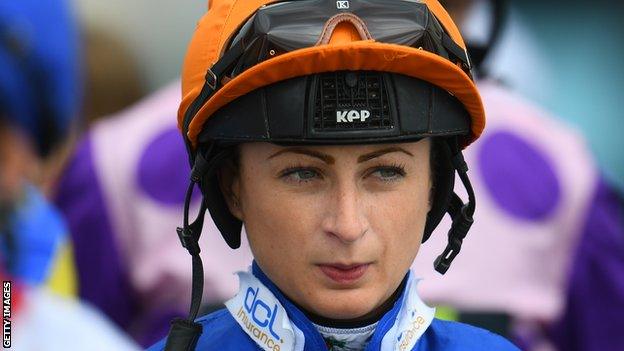
Nicola Currie is a potential rider at the Saudi Cup, trainer Jamie Osborne has indicated
What is the Saudi Cup?
It is the main race, with prize money of $20m (£16.1m), at King Abdulaziz racetrack where five other races will have additional prize money totalling $6.8m.
The pot for the main nine-furlong race is three times that of Europe's richest contest, the Prix de l'Arc de Triomphe in France.
Run on a one-turn dirt circuit, it will have a maximum of 14 starters, with $10m going to the winner and even the 10th-placed finisher earning $200,000.
Two of the supporting races will take place on the same track, with three others on a new turf course.
One of those races on grass is a 'staying handicap' over just under two miles and could attract the kind of runners that compete in the Ebor Handicap at York and Australia's Melbourne Cup.
Organisers anticipate a racecourse crowd of around 12,000 people for the opening year, with ticket buyers guaranteed visas for a country which has traditionally restricted visitors from overseas.
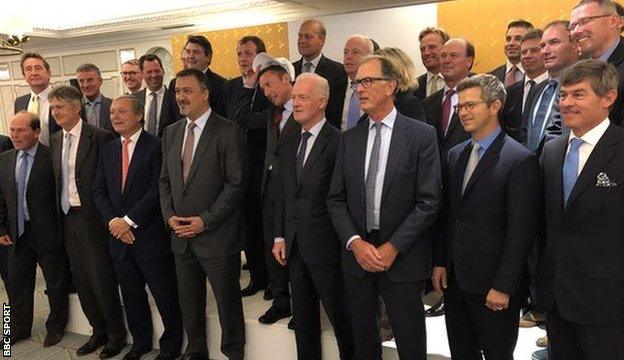
Prince Bandar was joined by Frankie Dettori and more than 20 trainers at an event to promote the new fixture
Who is behind it?
A team of racing experts has been established quickly.
Tom Ryan, a man credited with helping revitalise Naas racecourse in Ireland, was recruited in January to be strategic director.
Phil Smith, the ex-Grand National handicapper who set the weights that horses would carry in the Aintree race, has been drafted in for a similar role.
Harry Herbert, a well-connected British racing figure, is global ambassador.
Leading the project is a member of the Saudi royal family - Prince Bandar bin Khalid Al Faisal, chairman of the Jockey Club of Saudi Arabia.
"Our goal is for everyone who attends to enjoy their time, enjoy the race and come back the year after," said the prince, who is a great grandson of King Abdulaziz, founder of the modern Saudi Arabia.
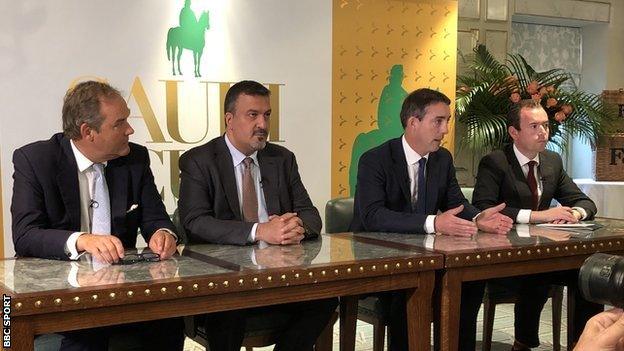
Global ambassador Harry Herbert, Prince Bandar and Saudi Cup strategic director Tom Ryan alongside broadcaster Nick Luck at a press conference
Raising the stakes - the world's richest race |
1984 - Breeders' Cup Classic - $3m |
1996 - Dubai World Cup - $4m |
2010 - Dubai World Cup - $10m |
2017 - Pegasus World Cup - $12m |
2020 - Saudi Cup - $20m |
Why is Saudi Arabia getting involved in sport?
While oil has fuelled booming economies, there is a need for other income streams - which is where tourism and entertainment comes in.
Motorsport's Race of Champions, a European Tour golf event and boxing match featuring Britain's Amir Khan have been held in Saudi.
Horse racing, and sport more generally, has been down this track before - benefiting financially from the interest of Dubai and Qatar, where questions have also been raised about equality and freedom of speech.
The fragile political situation in the Middle East will have made for some interesting discussions.
However, while Saudi and Qatar might not be on speaking terms, it is understood that Prince Bandar has dealt directly with Dubai ruler Sheikh Mohammed over the racing project.
The Saudi Cup takes place a month before the Dubai World Cup, which for many years was the world's richest race. Trainers may well keep horses in the region to compete at both fixtures.